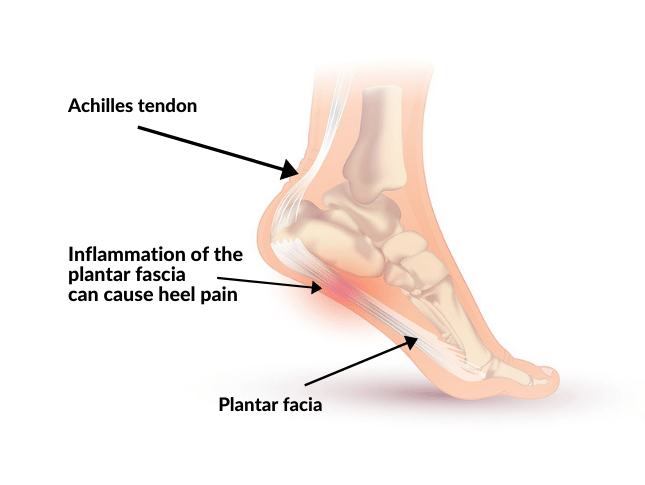Specialist Plantar Fasciitis care in Bristol
Plantar fasciitis is where you have pain on the bottom of your foot, around your heel and arch. Read on for symptoms, causes and how we can help.
Plantar fasciitis is a painful condition and one of the main causes of heel pain – specifically the bottom of the heel, the bit we stand on. The pain is often severe and can cause you to limp and find it difficult to walk.
Using world-leading scanning technology, our Physiotherapists will build a treatment plan tailored to your individual health goals, as well as delivering fast and effective pain relief.
-
What is Plantar Fasciitis?
Plantar fasciitis is a painful condition and one of the main causes of heel pain – specifically the bottom of the heel, the bit we stand on. The pain is often severe and can cause you to limp and find it difficult to walk.
Plantar Fasciitis can prevent you from enjoying your hobbies, especially sports. Sometimes, the condition can force you to take sick leave, and we’ve known people struggle so badly they can't put their foot down.What Can Go Wrong?
The plantar fascia is a flat band of tissue that connects your heel bone to your toes, supporting the arch of your foot. If you strain your plantar fascia, it becomes weak, swollen & inflamed, causing foot pain.
Up to 15% of all adults will get plantar fasciitis at one point or another in their life. It tends to affect to 40-60 year age group, but can also happen at any age. The condition occurs in people with an obesity issue and in sports people.

Image courtesy of Injurymap Common symptoms of Plantar fasciitis include:
- The chronic pain is most acute when you first put your weight on the heel – first thing in the morning particularly or when you get up from sitting
- The pain may often come on after longer walks or periods of standing
- There’s usually nothing to see – maybe some mild swelling
- The pain is all on the inside!
What Can Cause Plantar Fasciitis
Plantar fasciitis is caused by straining the part of your foot that connects your heel bone to your toes (plantar fascia).
The risk factors below mean you may be more likely to get plantar fasciitis if you:
- Recently started exercising on hard surfaces
- Exercise with a tight Achilles tendon, calf muscles or heel
- Overstretch the bottom of your foot during exercise
- Recently started doing a lot more walking, running or standing up
- Wear shoes with poor cushioning or support
- Are very overweight
- Have high arches or flat feet
Specialist Treatment And Prevention Of Plantar Fasciitis...
We don’t recommend ignoring it. It is commonplace for the pain to become increasingly chronic and then you struggle to get rid of it. A recent study found at 10 years after it started 44% still had symptoms when not treated.
If you start to develop the signs, rest and protect the heel area. Stop the sport or hobby that triggered it for a few weeks. Stop going barefoot or in flip-flops or slippers. Wear cushioned, supportive footwear, including trainers, wear shoe inserts at all times.
Keep active – don’t become afraid to weight-bear but equally cut down on long periods of standing and overuse. Practice stretching exercises, taping the ankle and arch of the foot to stabilise the foot.Anti-inflammatory medication or ibuprofen don’t help much unfortunately. But consider an ice pack or you might find either a heel pad. An over-the-counter arch support or supportive shoes could help.
If after a few weeks the pain is lingering or stopping you from going back to full work or sport, we would recommend an assessment to consider if you're going to need further treatment of plantar fasciitis.At The Medical, we specialise in the diagnosis, medical advice, healthcare treatment, pain relief and prevention of Plantar Fasciitis:
- Diagnosis - a Gait Analysis and 3D Movement Analysis as part of a full Physiotherapy Assessment
- Orthotics - our custom foot orthotics help with plantar fasciitis by providing strength and support to the arch and bottom of the foot. Holding the foot in its optimal position, the insoles help stabilise the arch to allow healing & recovery of the plantar fascia ligament
- Treatment - our experts will combine manual therapy, acupuncture and physical therapy rehabilitation exercises
Your road to recovery begins with a full assessment including Gait Analysis.
If you have a particular question about Tennis Elbow, why not ask one of our expert clinicians for some free advice?
-
Should I see a Physiotherapist?
Physiotherapy is for everybody. Whether your suffer from long term back pain, your wrist is aching from working at the kitchen table, you’ve pulled your shoulder at the gym, or you slept funny and woke up with a niggle in your neck…
Booking in for an assessment with one of our specialists will put your mind at ease, provide you with a sound explanation, and a plan to combat the pain.
We’re all guilty of putting our bodies on the back-burner, but it’s best to take the first step and catch pain early to prevent it progressing down the line. The sooner we get it sorted, the better!
-
What are orthotics?
Foot orthotics are custom made medical insoles. They are made individually for you and are a support that fits inside your shoes.
Most foot pain is as a result of faulty alignments of the foot bones and foot shape. This poor alignment can cause bunions, toe deformities, pain in the heel and arches and balls of the foot.
Foot orthotics are used to realign these foot joints and reduce the stresses on the painful over-worked joints, tendons and ligaments. Foot orthotics are carefully shaped to gently lift collapsed arches or alter the position of feet that lean in or out too far.
Westbury-on-Tyrm
- Call 01172 444 542
- Free parking
- Onsite rehab gym
- Early and late appointments
Temple Quay
- Call 0117 244 4540
- Great public transport links
- Onsite rehab gym
- Early and late appointments
Keynsham
- Call 01179 866 578
- Free parking
- Onsite rehab gym
- Early and late appointments

